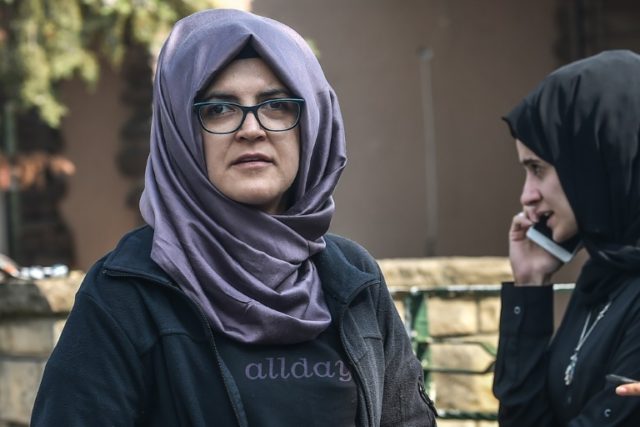Slain Washington Post contributor Jamal Khashoggi’s fiancee Hatice Cengiz spoke at a memorial service in London on Monday where she called on U.S. President Donald Trump to “help reveal the truth and ensure justice be served.”
The chief prosecutor of Istanbul on Wednesday leveled the first formal charge that Khashoggi was immediately murdered when he entered the Saudi consulate and his body was dismembered.
Cengiz was not making a heartfelt plea for U.S. assistance; her goal was to castigate Trump and the rest of the U.S. government for helping Saudi Arabia evade responsibility for his death. She made up her mind that the Trump administration is not “sincere in its efforts to solve Khashoggi’s killing” some time ago, refusing an invitation to visit the White House last week because she thought Trump would use the meeting to influence U.S. public opinion. She wrote a subsequent op-ed stating she would only meet with Trump if he “makes a genuine contribution to the efforts to reveal what happened inside the Saudi consulate in Istanbul that day.”
“I am disappointed by the actions of the leadership in many countries, particularly in the U.S.,” she said in London. “President Trump should help reveal the truth and ensure justice be served. He should not pave the way for a cover-up of my fiance’s murder. Let’s not let money taint our conscience and compromise our values.”
“He should not pave the way for a cover-up of my fiance’s murder. Let’s not let money taint our conscience and compromise our values,” she said of President Trump.
Khashoggi made his fateful visit to the Saudi consulate on October 2 to obtain paperwork related to his divorce so he could remarry Cengiz, who is Turkish. She said in London that she wished she had gone with him or visited the consulate in his place. In previous interviews, she indicated Khashoggi thought such measures were unnecessary because he received a surprisingly warm welcome during an initial visit to the consulate four days before his death.
“If only I knew that would be the last time I would see my Jamal, his smile, hear his laughter, I would have stood in front of that murderous team myself,” she said.
“This incident, this assassination, took place in the Saudi consulate,” Cengiz declared on Monday. “So the Saudi authorities probably know how such a murder took place. They need to explain what happened.”
President Trump’s recent public comments on the Khashoggi slaying are not actually very far from what Cengiz has said. For example, last week he described the Saudi response to the killing as the “worst in the history of cover-ups,” said whoever ordered the operation “should be in big trouble,” and expressed skepticism the attack on Khashoggi could have been carried out without the knowledge of Saudi Arabia’s functional chief executive, Crown Prince Mohammed bin Salman.
Even in her fiery London memorial speech, Cengiz came up short of directly accusing the crown prince of involvement in the murder, although she was adamant that “all those responsible, from the person who gave this order to those who carried it out” should be punished under international law.
The unspoken assumption behind the criticism from Cengiz is that Saudi leaders face few real consequences beyond chiding from the U.S. and other allied governments.
On Wednesday, the chief prosecutor in Istanbul issued a statement that said Turkish investigators have concluded Khashoggi was strangled as soon as he entered the Saudi consulate on October 2 in a premeditated killing and his body was dismembered for disposal.
The Saudis have, at various times over the past four weeks, claimed the team sent from Saudi Arabia to Istanbul tried to verbally confront or arrest Khashoggi and he was accidentally killed when he resisted or accused him of barging into the consulate and provoking a violent confrontation with security forces. The Saudis have claimed his intact body was wrapped in a rug and given to a “local operator” for disposal, a contact they have refused to identify.
The Turkish prosecutor indicated this week’s visit to Istanbul by Saudi chief prosecutor Saud al-Mojeb produced “no concrete result,” leaving Turkish authorities with little new information and making no progress on the extradition of the 18 suspects Saudi Arabia has identified in the killing.
“Saudi officials seemed primarily interested in finding out what evidence the Turkish authorities had against the perpetrators. We did not get the impression that they were keen on genuinely cooperating with the investigation,” a Turkish official told the Washington Post on Wednesday.

COMMENTS
Please let us know if you're having issues with commenting.